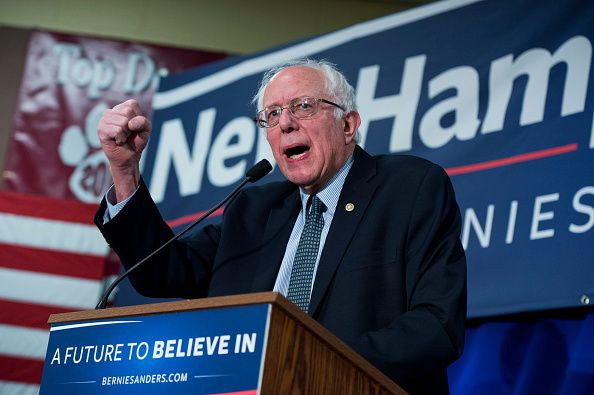Will Bernie Sanders Win New Hampshire Primary? Youth Turnout Could Help Candidate Beat Hillary Clinton

The youngest voters may make all the difference for the oldest candidate in 2016.
With Vampire Weekend's endorsement and #feelthebern graphic T-shirts, Vermont Sen. Bernie Sanders' campaign has proven popular among revolution-minded millennials for months. But his success in Iowa comes with a big question amid the congratulations: Can he do it again next Tuesday in the New Hampshire primary? Although the Granite State's population is slightly older and has more independent-leaning youth, political experts said a Sanders victory was possible because the percentage of influential millennials casting ballots may even be higher.
"New Hampshire has a better track record in terms of reliably turning out young people," said Kei Kawashima-Ginsberg, director of Tufts University's Center for Information and Research on Civic Learning and Engagement (CIRCLE) in Medford, Massachusetts. "If candidates are thoughtful about reaching out to young people, they will start to come out to things like caucuses and primaries. They are not written off."
College students flooded the Iowa caucuses Monday night to back Sanders, the 74-year-old senator famous for his progressive rhetoric. Once considered an underdog candidate, Sanders ended the night tied with former secretary of state and Democratic powerhouse Hillary Clinton.
In New Hampshire, millennials make up about a third of the voting electorate. The notoriously fickle demographic, however, can be hard to figure out. They want a president they can relate to more than one with policy chops. As a result, red-in-the-face Sanders has excelled while always-calm Clinton has struggled to connect with millennials who dislike her mainstream reputation and ties to bureaucracy. This was especially evident Monday in Iowa, where exit poll data showed Sanders had the backing of 84 percent of 17- to 29-year-old Democratic caucusgoers.
The youth vote can make or break a campaign and it's been the former so far for Sanders, who's held packed rallies at colleges full of students excited by his promises of free tuition and vows to bust Wall Street.
But Kawashima-Ginsberg noted the campus-centric strategy might not play as well in New Hampshire, where the population tends to be more mature than Iowa's. "The youth are a little bit less likely to be in college right now," she said. The data backs her up: As of 2012, New Hampshire had about 83,000 college students to Iowa's 361,000.
The students the state does have were already #feelingthebern this week ahead of Tuesday's primary. One survey found almost 90 percent of 18- to 29-year-old Democrats in the state supported the senator.
A factor in Sanders' favor in New Hampshire is his home state's proximity, Kawashima-Ginsberg said. Young people who might not pay close attention to politics are likely still familiar with his name and platform because his constituency is so near to them.
Sanders has also framed himself as a Washington outsider, a theme that boosted the poll numbers for former Vermont Gov. Howard Dean in 2004 and Texas Rep. Ron Paul in 2008 in previous Granite State primaries. In 2012, CIRCLE reported 45 percent of young voters in New Hampshire identified as "independent" or "something else." They're Sanders' to win — or lose.
The setup of the New Hampshire primary could increase overall youth turnout, Kawashima-Ginsberg said. Voting is done by ballot as opposed to the "intimidating" Iowa process where caucusgoers have to physically show up and defend their choices. It's also more flexible in terms of time. In Iowa participants had to show up at 7 p.m., whereas in New Hampshire, voters can choose when to vote within a window of time. This is especially helpful for students with unpredictable schedules, Kawashima-Ginsberg said.
Andrew Smith, director of The Survey Center at the University of New Hampshire in Durham, said the date of the state primary bodes well for participation. The 2008 and 2012 New Hampshire votes were in early January before many colleges had resumed classes after winter break, but Tuesday's is late enough that most students will be on campus — and therefore easier to reach.
This was especially true in the case of out-of-state college students enrolled in New Hampshire, who can vote in the primary due to loose residency requirements, Smith said. More than 30 percent of would-be voters weren't old enough to cast ballots in 2008 or simply didn't live in the Granite State. "The students are here," Smith said. "They likely will vote for [Sanders] if they vote at all."
Despite the distance, Sanders' showing in Iowa could help him in the New Hampshire primary, Smith said. His tie with Clinton keeps the enthusiasm up, especially among first-time voters who feel like they can make a difference.
Lucas Meyer, the 25-year-old president of the New Hampshire Young Democrats, said he was confident the youth would turn out in force next week because Clinton and Sanders are both tackling issues millennials care about, like student debt and climate change.
The Manchester resident said he couldn't predict which candidate would emerge victorious but said everyone in the state was a part of the process. "It's a presidential election and you're in New Hampshire," Meyer said. "There's a lot of excitement whether you're 12 years old or 99 years old."
© Copyright IBTimes 2025. All rights reserved.






















